Juneteenth: Why We Celebrate
What is Juneteenth and why is it important to recognize it within our education systems? Learn more about the holiday with your student by utilizing the resources below.
.jpeg)
Emancipation Park in Houston, circa 1880s via The Public Domain Review
Even though the Emancipation Proclamation was made effective in 1863, not all slaves in Confederate territory were immediately freed. Their freedom wasn’t until June 19, 1865, when 2,000 Union troops arrived in Galveston Bay, Texas, to announce that more than 250,000 enslaved Black people in the state were free by executive decree.
Deemed “Juneteenth” by the newly freed people in Texas, the historic event is now celebrated as a federal holiday on June 19 each year.
-1.jpeg)
Juneteenth celebrations in Richmond, Virginia, circa 1905 via The Public Domain Review
In recognition of Juneteenth, PA Distance Learning Charter School staff attended the Philadelphia Juneteenth Parade and Festival on June 18.
Started by the Pennsylvania Juneteenth Initiative, it is the largest annual celebration in the nation attended by thousands who join together to have fun, embrace their history, and continue the tradition of Kujichagulia (self-determination). It is held at the historic Malcolm X Park with over 250 vendors and a musical concert for the entire family to enjoy.
.jpg)
Photo via Philadelphia Juneteenth Parade & Festival
Having a conversation about topics such as racism and equality with your student might be tough or uncomfortable. Check out these books below to help initiate the conversation:
- A Is for All the Things You Are: A Joyful ABC Book: This alphabet board book introduces young readers to 26 key traits they can cultivate as they grow. It also supports the joy of human diversity and inclusion.
- Our Skin: A First Conversation About Race: This picture book presents historical context to learn about skin color, race, and racism while educating children on how to use their voices to stand for fairness.
- Love Twelve Miles Long: Through this story inspired by the life of Frederick Douglass, readers explore questions about resilience, the injustice of slavery, and the hope of freedom.
Juneteenth marks the second independence day for the United States. It is crucial to remember that although we have made significant societal advancements throughout history, much work remains to be done. Educate yourself and advocate for those around you as we move toward an equitable tomorrow.
Click here to check out The Smithsonian Institute’s Juneteenth Digital Toolkit for more resources.

